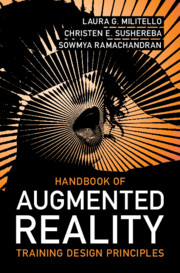Book contents
- Handbook of Augmented Reality Training Design Principles
- Handbook of Augmented Reality Training Design Principles
- Copyright page
- Dedication
- Contents
- Figures
- Tables
- Preface
- Acknowledgments
- Chapter 1 Introduction
- Chapter 2 Recognition Skills
- Chapter 3 Engagement
- Chapter 4 Scenario Building
- Chapter 5 Fidelity and Realism
- Chapter 6 Supporting Mental Model Construction
- Chapter 7 Scaffolding and Reflection
- Chapter 8 Synthesis
- Chapter 9 Conclusion
- References
- Index
Chapter 6 - Supporting Mental Model Construction
Published online by Cambridge University Press: 18 May 2023
- Handbook of Augmented Reality Training Design Principles
- Handbook of Augmented Reality Training Design Principles
- Copyright page
- Dedication
- Contents
- Figures
- Tables
- Preface
- Acknowledgments
- Chapter 1 Introduction
- Chapter 2 Recognition Skills
- Chapter 3 Engagement
- Chapter 4 Scenario Building
- Chapter 5 Fidelity and Realism
- Chapter 6 Supporting Mental Model Construction
- Chapter 7 Scaffolding and Reflection
- Chapter 8 Synthesis
- Chapter 9 Conclusion
- References
- Index
Summary
Mental models are the internal representations that guide interactions with the world. Mental models are experience based and they inform an individual’s understanding of what is going on, how things work, and how a situation is likely to evolve. This chapter provides two principles for supporting the development of robust mental models in trainees. The Mental Model Articulation Principle emphasizes building training experiences that encourage learners to verbalize aspects of their mental models to identify flaws and gaps. The Many Variations Principle highlights the value of providing learners with a range of experiences with the intent of expanding their mental models to support performance in diverse conditions.
Keywords
- Type
- Chapter
- Information
- Handbook of Augmented Reality Training Design Principles , pp. 76 - 90Publisher: Cambridge University PressPrint publication year: 2023

